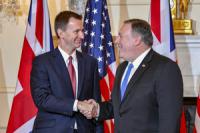-
AG: Muller did not find that Trump’s campaign “conspired with the Russian government” 2016 election interference effort
On Saturday afternoon, Attorney General William Barr sent Congress his “principal conclusions” of the Mueller report. Barr quotes the Mueller report to say that “[T]he investigation did not establish that members of the Trump Campaign conspired or coordinated with the Russian government in its election interference activities.” The Mueller report does not take a position on whether or not Trump engaged in obstruction of justice. Barr writes: “The Special Counsel… did not draw a conclusion — one way or the other — as to whether the examined conduct constituted obstruction.” The AG quotes the report to say that “while this report does not conclude that the President committed a crime, it also does not exonerate him.”
-
-
U.S. to Germany: Huawei deal could harm intelligence sharing

The United States on Monday warned Germany about future “information sharing” if it uses “untrusted vendors” in its 5G telecom infrastructure amid debate over whether Chinese IT giant Huawei is an espionage risk.
-
-
Another Steel Dossier detail appears true
On the final page of his 35-page dossier, former British intelligence officer Christopher Steele refers to a company, whose name is redacted, that allegedly was used to hack the Democratic party. Today, the New York Times identifies the company and its owner, Aleksej Gubarev, and says that according to a newly revealed report, the allegations against the Russian technology entrepreneur’s operations check out.
-
-
Russia attempted 2018 interference, gearing up to infiltrate election systems in 2020
Defense Department and Homeland Security officials warn Russia did try to interfere in the 2018 election, and the United States is not prepared for what foreign adversaries likely will launch in 2020. One official told lawmakers on the House Appropriations Homeland Security Subcommittee that “what keeps him up at night” is thinking about the new ways adversaries will attempt to infiltrate US election systems in 2020.
-
-
Trapdoor found in SwissVote election system

Researchers have examined the source code published as part of the SwissPost e-voting system, provided by Scytl, and discovered a cryptographic trapdoor. If exploited, researchers say this could allow insiders who ran or implemented the election system to modify votes undetected.
-
-
Deterrence in the cyber age: U.K. Foreign Secretary's speech

U.K. foreign secretary Jeremy Hunt last Thursday spoke at Glasgow University on cybersecurity and the U.K. government’s approach to deterring cybercrime. “In the cyber age, an authoritarian regime armed with nothing more ambitious than a laptop computer could try to manipulate our democracy, Hunt said. “For every example of publicly attributed interference [by Russia], there have been others that never saw the light of day.” He added: “The material fact is that the Russian state has tried to subvert democracy,” concluding: “We can no longer afford to wait until an authoritarian regime demonstrably succeeds in changing the outcome of an election and weakening trust in the integrity of democracy itself. The risk is that after just a few cases, a pall of suspicion would descend over a democratic process – and once that happens, the damage would be difficult, perhaps impossible, to repair.”
-
-
China's Huawei sues U.S. government over ban

Chinese tech giant Huawei has sued the U.S. government, arguing that legislation Congress passed last year that restricts its business in the United States is “unconstitutional.” The case, which analysts see more as a public relations move, is but the latest in an intensifying effort by the telecommunications company to fight U.S. security concerns, which Huawei argues are unfair and unfounded.
-
-
Canada must not be naive when dealing with China’s authoritarian regime

A new book on Canada-China relations offers lessons for the United States. The book “is in many ways a primer on the central challenge of our era – the question of how democracies address the scope and depth of an authoritarian wave now picking up momentum,” writes Hugh Segal, a Canadian foreign policy expert. “Our engagement with China must set aside the temptations of presuming fair minded universal intent on the part of Chinese state-controlled instruments, economic, diplomatic or military. We must be more focused on the protection of our own security and freedoms from Chinese subversion. Countries that wish access to our resources, technology and investment on normative terms do not get to launch cyberattacks against us, from military and intelligence units controlled by the state.”
-
-
New approach needed to arrest democratic decline
A new Brookings report examines the emergence and diffusion of the illiberal toolkit from Turkey to Central Europe. It assesses how illiberal political actors have eroded checks and balances in several countries within the European Union and NATO and proposes concrete policy options for responding to democratic decline.
-
-
U.S. Cyber Command cut Russian troll factory’s access to the internet

The U.S. Cyber Command blocked the internet access of the St. Petersburg’s-based Internet Research Agency (IRA), a Russian disinformation and propaganda outfit which was contracted by the Kremlin to orchestrate the social media disinformation campaign to help Donald Trump win the 2016 presidential election. The IRA’s access to the internet was blocked on midterms Election Day, and for a few days following the election.
-
-
Report finds that Corbyn aide, Seumas Milne, has ties to Hamas
An explosive investigative report by a British newspaper has unearthed long-standing ties between Seumas Milne, a senior aide to the Labour Party’s leader Jeremy Corbyn, and terrorist organizations committed to the destruction of Israel. The investigation also revealed Milne’s extensive ties to organizations linked to the Kremlin. Sir Richard Dearlove, who led the Secret Intelligence Service MI6 from 1999 to 2004, said: “Anyone with his sort of background could not be let anywhere near classified information. It would be out of the question. That means Corbyn could not make the judgments and decisions a PM has to make unless he stopped consulting him.”
-
-
It’s spy vs. spy vs. spy

“I think what we’re seeing unfolding on the news every day right now is, potentially, the greatest intelligence or espionage scandal in modern history, maybe in history, full stop. The Kremlin has managed to get a candidate who’s very favorable to itself in the White House. It is still slightly hypothetical, because we don’t know the results of the investigation, but the fact that [the FBI] started an investigation at all, and this question had to be asked at all, shows how weird and unprecedented this situation is. If the music stops right now and actually there’s nothing to it, still the fact that we had to ask this question, and it was investigated, is extraordinary,” says Calder Walton, Ernest May Fellow in History and Policy at Harvard Kennedy School (HKS) and editor of the forthcoming 3-volume The Cambridge History of Espionage and Intelligence.
-
-
U.S. charges former Air Force intel officer with spying for Iran
A former U.S. Air Force counterintelligence officer who defected to Iran six years ago has been charged with spying for the Iranian government and helping Iran target other U.S. intelligence agents. Monica Elfriede Witt, 39, was indicted by a federal grand jury in Washington on charges of disclosing the code name and classified mission of a U.S. military special access program to the Iranian government. She was also charged with helping Iranian intelligence services in targeting her former co-workers, according to an indictment unsealed Wednesday.
-
-
Huawei espionage arrests in Poland: A wake-up call to Europe
U.S. and European intelligence services have been warning that Huawei, a jewel in the crown of the China’s growing technology industry, cannot be trusted in its protestations that it does not cooperate with the country’s intelligence agencies, or that it respects the rule of law and the intellectual property of its competitors. European governments should exclude Huawei from their telecommunications infrastructure before the company becomes too enmeshed in the continent’s 5G systems to be fully, securely, and painlessly removed at a later date. Failure to do so would give China truly unprecedented tools to corrupt, influence, and subvert Western democracies and the rule of law that is so vital to their continued health and the health of the post-War international system.
-
-
Russia is attacking the U.S. system from within
A new court filing submitted last Wednesday by Special Counsel Robert Mueller shows that a Russian troll farm currently locked in a legal battle over its alleged interference in the 2016 election appeared to wage yet another disinformation campaign late last year—this time targeting Mueller himself. Concord Management and Consulting is accused of funding the troll farm, known as the Internet Research Agency. But someone connected to Concord allegedly manipulated the documents and leaked them to reporters, hoping the documents would make people think that Mueller’s evidence against the troll farm and its owners was flimsy. Natasha Bertrand writes that “The tactic didn’t seem to convince anyone, but it appeared to mark yet another example of Russia exploiting the U.S. justice system to undercut its rivals abroad.”
-
- All
- Regional
- Water
- Biometrics
- Borders/Immig
- Business
- Cybersecurity
- Detection
- Disasters
- Government
- Infrastructure
- International
- Public health
- Public Safety
- Communication interoperabillity
- Emergency services
- Emergency medical services
- Fire
- First response
- IEDs
- Law Enforcement
- Law Enforcement Technology
- Military technology
- Nonlethal weapons
- Nuclear weapons
- Personal protection equipment
- Police
- Notification /alert systems
- Situational awareness
- Weapons systems
- Sci-Tech
- Sector Reports
- Surveillance
- Transportation
Advertising & Marketing: advertise@newswirepubs.com
Editorial: editor@newswirepubs.com
General: info@newswirepubs.com
2010-2011 © News Wire Publications, LLC News Wire Publications, LLC
220 Old Country Road | Suite 200 | Mineola | New York | 11501
Permissions and Policies
Editorial: editor@newswirepubs.com
General: info@newswirepubs.com
2010-2011 © News Wire Publications, LLC News Wire Publications, LLC
220 Old Country Road | Suite 200 | Mineola | New York | 11501
Permissions and Policies
